This story references domestic abuse.
Five years ago, I abandoned my career as a support worker at a women’s refuge in Yorkshire. It was my job to assist clients through the most dangerous periods of their lives: leaving their abusers. I’d also spend a lot of time on the phone talking to desperate women with hushed voices who weren’t quite there yet, who had carved out a temporary ‘safe’ space to ask for help. I wanted to tell them that I would come and pick them up and that they’d be safe now. And that everything would be OK. I stopped working in domestic violence services because I knew that was a lie.
Leaving an abuser is the most dangerous time for any victim of domestic violence. Read (and read again) the following stat: 41% (37 of 91) of women killed by a male partner/former partner in England, Wales and Northern Ireland in 2018 had separated or taken steps to separate from them. According to the Femicide Census 2020, eleven of these women were killed within the first month of separation, and 24 were killed within the first year.
Beyond the physical threat of danger, a victim/survivor of domestic abuse may also navigate the legal system, especially if there are children involved. They may have to ‘prove’ that their abuse really happened, that it’s more than their word against the abuser’s. Thanks to unfit-for-purpose legal infrastructure, they will probably tell their story to multiple agencies before waiting years to tell it in a courtroom. Even then, there’s no guarantee that justice will be served.
In 2022, I watched in horror as celebrities, brands, and regular social media users lapped up Johnny Depp’s accusation that Amber Heard had defecated on his bed after a period of sustained physical and verbal abuse against him. During a three-month civil trial in which Depp sued Heard for defamation after The Washington Post published an op-ed in which she described herself as a “public figure representing domestic abuse”, social media was awash with out-of-context clips that “proved” it was Heard who had abused Depp, actually. The court ultimately decided in Depp’s favour, finding that Heard had defamed Depp.
Some online critics adopted a loftier position, describing Depp and Heard’s relationship as “toxic” and noting that they were just “as bad as each other”.
Back when I worked on domestic violence helplines, I was trained to spot abusers who would call the refuge and describe how their partners – their victims – had been abusing them. Their logic? If they reported domestic abuse against their partners, said partners could never present themselves as a victim in court. If they could convince the courts that it was “mutual abuse”, a word used by a clinical psychologist in the Depp v Heard trial, the abuse cycle could continue. In short, it was a foolproof method of torturing and gaslighting their victims.
Domestic abuse can happen to (and be committed by) anyone, including famous people. In the past year or so since Depp v Heard, many high-profile allegations of domestic abuse have been sceptically received online, with many adopting the language of “mutual abuse”.
The most prominent example right now is Keke Palmer, who has been granted a temporary domestic violence restraining order against her ex-partner, Darius Jackson, as well as temporary sole custody of their eight-month-old child, Leodis. The actor alleges that Jackson abused and “love-bombed” her over a period of two years. Jackson has not publicly addressed the allegations and has limited who can see his social media accounts.
On 15 November, Armon Wiggins, a self-described “LA Based Media Personality”, shared an unverified audio purportedly between Keke Palmer and Darius Jackson in which she appears to say, "It’s my bad to put my hands on you… even though you did whatever that you did to make me feel that way.”
One person replied, “Sound[s] like possibly two abusive people got together and are currently meeting their match with each other”, while another added, “Sounds like two abusive narcissists linked up.” While plenty of social media users called out Wiggins for sharing the clip without any context, it's fascinating (and alarming) to see how easily the narrative of “mutual abuse” is received.
Violence against women and girls is not inevitable.

Fundamentally, the notion of mutual abuse requires that all parties in the relationship display abusive behaviours towards each other, from physical acts, such as hitting, to financial control, such as withholding money. But these behaviours don't exist in a vacuum. Abusive relationships are about two things: power and control. Ellen Miller, Interim CEO of Refuge, tells GLAMOUR that the term “implies a shared responsibility for abuse between a survivor and perpetrators when in reality, abuse is a choice that the perpetrators make actively and alone.”
She adds, “Perpetrators will utilise the idea of mutual abuse to avoid taking full accountability for their actions by shifting the blame onto the survivor. This, in turn, leads to victim-blaming and diminishes the survivor's very real experiences of abuse.”
In her essay ‘Domestic Abuse Survivors Who Fight Back’, Dr Emma Katz, an academic at Durham University, further debunks the concept of mutual abuse, identifying several reasons why people experiencing intimate terrorism or coercive control may fight back against their partners, including self-defence from immediate danger; protecting their “psychological health and sense of sanity”; and asserting themselves in a situation where their “selfhood is being crushed and [their] rights taken away.”
She powerfully concludes that “The survivor would have nothing to fight back against if the abuser stopped abusing them.”
I dream of a world like this, where society's efforts to end domestic abuse actually target the perpetrators instead of playing into their hands, where we'd trust survivors' voices rather than invent twisted narratives like “mutual abuse” to distort them. Sadly, that world feels further away than it did when I quit my job at the women's refuge.
If you need more information about emotional abuse and domestic abuse, you can call The Freephone National Domestic Abuse Helpline, run by Refuge on 0808 2000 247.
“Baby this is Keke Palmer…”

